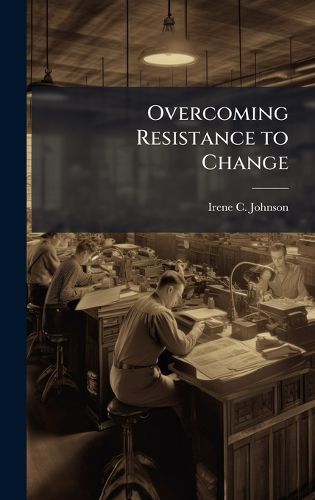Readings Newsletter
Become a Readings Member to make your shopping experience even easier.
Sign in or sign up for free!
You’re not far away from qualifying for FREE standard shipping within Australia
You’ve qualified for FREE standard shipping within Australia
The cart is loading…






The goal of this research was to investigate the impact of change on organizations, in the absence of a preparedness program and to develop strategies for overcoming resistance to change, in the midst of a proposed initiative that has become stalled as a result of mistrust and cynicism. The results of this research suggests a framework of management techniques that will offer leadership approaches to resurrecting a stalled change initiative and overcoming personnel's resistance to a proposed change project, in order for the project to be more widely accepted. A series of personal interviews and focus groups, a qualitative method approach, was used to gather information, gain insight, develop possible strategies, and suggest a framework for moving forward with a proposed change initiative in the midst of resistance. Data was primarily collected from mid-level to senior leadership. In addition, an extensive literature review was conducted to gain insight about known prescriptive methods, previously suggested strategies, and other published similarities and differences in the areas Change Management, Organizational Change, Resistance to Change, Overcoming Resistance to Change, and Organizational Development. It is hoped that the Armed Forces and the Department of Defense will benefit from future development of these proposed change management strategies.
This work has been selected by scholars as being culturally important, and is part of the knowledge base of civilization as we know it. This work was reproduced from the original artifact, and remains as true to the original work as possible. Therefore, you will see the original copyright references, library stamps (as most of these works have been housed in our most important libraries around the world), and other notations in the work.
This work is in the public domain in the United States of America, and possibly other nations. Within the United States, you may freely copy and distribute this work, as no entity (individual or corporate) has a copyright on the body of the work.
As a reproduction of a historical artifact, this work may contain missing or blurred pages, poor pictures, errant marks, etc. Scholars believe, and we concur, that this work is important enough to be preserved, reproduced, and made generally available to the public. We appreciate your support of the preservation process, and thank you for being an important part of keeping this knowledge alive and relevant.
$9.00 standard shipping within Australia
FREE standard shipping within Australia for orders over $100.00
Express & International shipping calculated at checkout
The goal of this research was to investigate the impact of change on organizations, in the absence of a preparedness program and to develop strategies for overcoming resistance to change, in the midst of a proposed initiative that has become stalled as a result of mistrust and cynicism. The results of this research suggests a framework of management techniques that will offer leadership approaches to resurrecting a stalled change initiative and overcoming personnel's resistance to a proposed change project, in order for the project to be more widely accepted. A series of personal interviews and focus groups, a qualitative method approach, was used to gather information, gain insight, develop possible strategies, and suggest a framework for moving forward with a proposed change initiative in the midst of resistance. Data was primarily collected from mid-level to senior leadership. In addition, an extensive literature review was conducted to gain insight about known prescriptive methods, previously suggested strategies, and other published similarities and differences in the areas Change Management, Organizational Change, Resistance to Change, Overcoming Resistance to Change, and Organizational Development. It is hoped that the Armed Forces and the Department of Defense will benefit from future development of these proposed change management strategies.
This work has been selected by scholars as being culturally important, and is part of the knowledge base of civilization as we know it. This work was reproduced from the original artifact, and remains as true to the original work as possible. Therefore, you will see the original copyright references, library stamps (as most of these works have been housed in our most important libraries around the world), and other notations in the work.
This work is in the public domain in the United States of America, and possibly other nations. Within the United States, you may freely copy and distribute this work, as no entity (individual or corporate) has a copyright on the body of the work.
As a reproduction of a historical artifact, this work may contain missing or blurred pages, poor pictures, errant marks, etc. Scholars believe, and we concur, that this work is important enough to be preserved, reproduced, and made generally available to the public. We appreciate your support of the preservation process, and thank you for being an important part of keeping this knowledge alive and relevant.